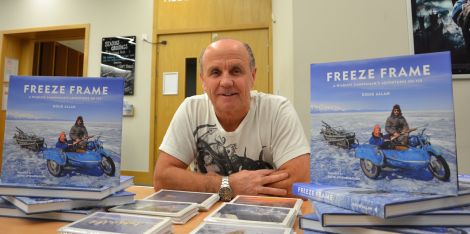News / Wildlife photographer’s climate warning
THERE are not many people who could fill Mareel on their own by telling stories, but wildlife photographer Doug Allan did just that on Thursday night.
World famous for his polar pictures on BBC series like Blue Planet, Planet Earth and Frozen Planet, Allan kept his 320-strong audience enthralled with his stories from the coldest parts of the world.
Allan’s Shetland show on Thursday was the last and best attended in a 19-date tour of the highlands and islands, a tour he described as “shorter than usual”.
The 63 year old’s career in photography began with a chance meeting with the broadcaster David Attenborough in 1983, while he was working for the British Antarctic Survey.
“He was very encouraging,” Allan said, and gave him the confidence to abandon his full time scientific job for a life behind the lens.
Photography was a hobby he shared with most people working in the Antarctic, and combined with his childhood love of diving and his familiarity with polar creatures made it the perfect career move from pure marine science.
Filming in the poles was a new thing back in the early 1980s, and for the next 15 years he was involved in every single wildlife report from the Antarctic and the Arctic, which he first visited in 1988.
Since then he has been a first hand witness to the impact of climate change, which he describes as “the most important issue facing the planet”.
“You can conserve all the bits of the sea and the land, but if you change the climate then all your efforts come to naught,” he warned.
He said that climate sceptics had done a very good job of making it sound as if the five or ten per cent of people who doubted man-made global warming actually amounted to 50 per cent.
Become a member of Shetland News
“Now you will not find a reputable climate scientist who will deny climate change caused by humans,” he said.
“For several years now the science has been very, very clear but we have been very, very slow about doing anything about it because it means a big change in our economic and political models.
“And unless we get together and get some big international treaties it is going to get much worse.”
Extreme weather events, such as floods in England and severe storms in the US, were already costing a fortune and would only get worse.
“Ten years ago Nicholas Stern said it would cost one per cent of the world’s GDP (gross domestic product) to tackle climate change.
“There are reports coming through now which suggest it will cost two per cent and that is only going to increase.
“It’s ironic that we found $7 trillion to bail out the banks when they went down; if you had put a fraction of that money into tackling climate change then we would have made some very significant in roads, instead of giving the banks the money to perpetuate a system that is causing all the damage.
“I think we need to start thinking pretty radically about it and possibly get off this economic model where everything goes up and up in a line, which never happens in nature or physics, where everything flattens out eventually.”
Allan is preparing a series of talks for the Royal Geographical Society on the subject, and said he would have to think very carefully about how he would be presenting such a complex subject.
“But I have seen it, believe me,” he said.
“You have to try to be optimistic, to keep doing things about it, to talk to people about it, because a change is only going to come if lots of people want it. It won’t happen if only one or two people want it.”
Become a member of Shetland News
Shetland News is asking its many readers to consider paying for membership to get additional features and services: -
- Remove non-local ads;
- Bookmark posts to read later;
- Exclusive curated weekly newsletter;
- Hide membership messages;
- Comments open for discussion.
If you appreciate what we do and feel strongly about impartial local journalism, then please become a member of Shetland News by either making a single payment, or setting up a monthly, quarterly or yearly subscription.




























































